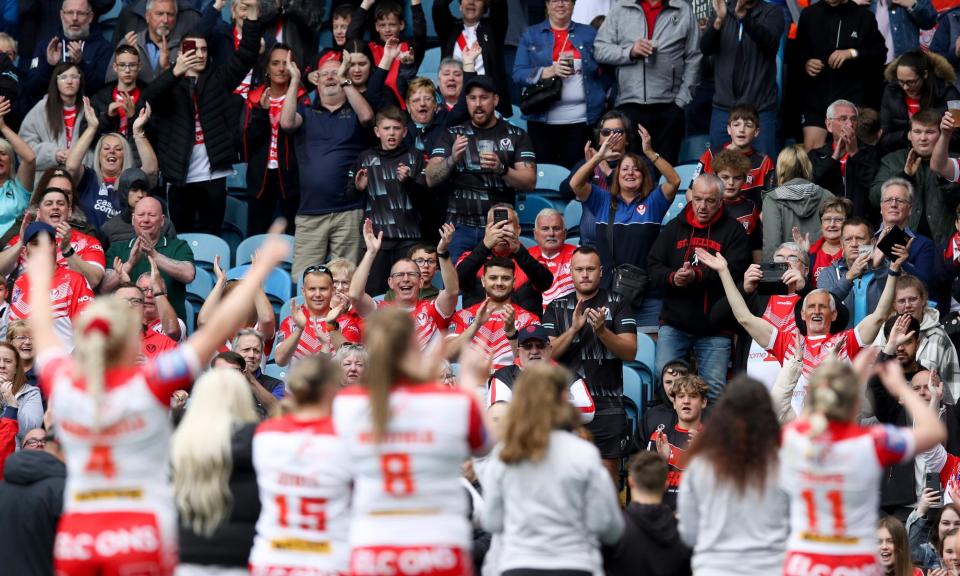
For casual observers of rugby league’s Women’s Super League, the conversation constantly revolves around one topic: the journey towards the day when the sport can emulate football and turn professional.
But the reality is the story is significantly different for so many of the stars of the sport as the 2024 season kicks off this weekend.
Naturally, every player in the WSL dreams of being able to quit their day job to become a professional. That day is still some way away, though the growth of the women’s game has continued in the off‑season with news that more clubs will pay players match payments, St Helens the most recent example. That takes the total of WSL clubs paying some or all of their players to five: two years ago, that number was zero.
But there is much more to the journey for women’s rugby league than payment. For some, there is a determination to leave a legacy far greater for those who follow in the years ahead. “The women’s game has gone from nought to 100 in the space of three or four years,” says Jodie Cunningham, the 32-year-old captain of St Helens. “I’m so passionate that I can be part of the women’s game, I’m really glad that I’ve got a voice in it.”
Related: Ruthless England impress in sinking Tonga for series clean sweep
St Helens are one of three heavyweights in the WSL, alongside Leeds and York, and are the favourites for the Challenge Cup, which they won at Wembley last year. The Saints’ decision to wait until now to introduce match payments did raise eyebrows given how much earlier their two big rivals made the move, but it is a considered approach to build the women’s programme from the bottom up.
Mike Rush, the St Helens chief executive, officer, says: “The game has to grow at the bottom of the pyramid, otherwise how do we improve the standard across the board? There’s an argument to say there’s three great teams and the rest a way behind. The RFL now have to grow the sport commercially because every club is losing money in the men’s game and we can’t just double that up in the women’s game. They’re still a long way from being full-time professionals, that’s the reality: but we’re trying to give them a professional experience elsewhere.”
With all the talk of pay, it is easy to forget how far the women’s game has come. York’s Kelsey Gentles was one of those who was there at the start of the WSL in 2017 with Castleford, when leading clubs were playing on park fields in front of barely anyone. This weekend, the 25‑year-old will return following an 18-month absence from the game after becoming pregnant and giving birth to a daughter, Maia. For Gentles, the opportunity to play again is reward enough, even without money.
“I went to a couple of games when I was pregnant and there were a couple of old rugby league fans saying: ‘You’ve ruined your career and should retire,’” she said this week. “I had planned to continue training during pregnancy, but I was diagnosed with a hip problem and was struck off all physical activity. When playing is taken away, you appreciate it so much more and I’ve really missed it.”
The challenge for the sport is twofold: to find new revenue streams to bring the pay dream closer to reality for all, and for the chasing pack to close the gap on Leeds, York and St Helens. That is the goal for Huddersfield, who are one of several clubs to introduce professional contracts this season.
Their captain, Bethan Oates, was a British champion in Muay Thai – sometimes called Thai boxing – before switching to rugby league at 19. She combines playing with a full-time job in a leisure centre and insists she is more motivated about building a legacy in the West Yorkshire town than chasing pay.
“For me, I wasn’t ever interested in playing anywhere else,” the 28‑year‑old says. “I’ve started here, I’ve been through the pathways and seen how much it’s changed, and I want to finish here. To be able to see the young girls coming through, that’s a big motivation for me. It’s crazy how far myself and the sport has come over the last five or six years.”
As Cunningham says, women’s rugby league has come a long way. There is still a way to go before professionalism can become a reality but sometimes it is prudent to take a step back and appreciate the journey to this point.
Article courtesy of
Source link